About Pancreatic Cancer
Each year in the United States, more than 43,000 people are diagnosed with cancer of the pancreas. Most are over 65 years old.
There are two main types of pancreatic cancer:
- Most often, pancreatic cancer starts in the ducts that carry pancreatic juices. This type is called exocrine pancreatic cancer. Information will focus on this type of pancreatic cancer.
- Much less often, pancreatic cancer begins in the cells that make hormones. This type may be called endocrine pancreatic cancer or islet cell cancer.
If you or a loved one has been diagnosed with pancreatic cancer, know that we are here for you. Our cancer care team of medical oncologists, radiation oncologists, and compassionate staff will support you and your family every step of the way. If you have questions about a pancreatic cancer diagnosis or would like a second opinion, reach out to the WVCI team. Our oncologists are located in Albany, Corvallis, Eugene, Florence, Lincoln City, and Newport, Oregon.
More Information About Pancreatic Cancer
Diagnosing Pancreatic Cancer
If you have symptoms that suggest cancer of the pancreas, your doctor will try to find out what’s causing the problems. You may have blood or other lab tests.
You may have one or more of the following tests:
Physical Exam
CT Scan
An X-ray machine linked to a computer takes a series of detailed pictures of your pancreas, nearby organs, and blood vessels in your abdomen. You may receive an injection of contrast material so your pancreas shows up clearly in the pictures. Also, you may be asked to drink water so your stomach and duodenum show up better. On the CT scan, your doctor may see a tumor in the pancreas or elsewhere in the abdomen.
Ultrasound
Your doctor places the ultrasound device on your abdomen and slowly moves it around. The ultrasound device uses sound waves that can’t be heard by humans. The sound waves make a pattern of echoes as they bounce off internal organs. The echoes create a picture of your pancreas and other organs in the abdomen. The picture may show a tumor or blocked ducts.
Endoscopic Ultrasound (EUS)
Your doctor passes a thin, lighted tube (endoscope) down your throat, through your stomach, and into the first part of the small intestine. An ultrasound probe at the end of the tube sends out sound waves that you can’t hear. The waves bounce off tissues in your pancreas and other organs. As your doctor slowly withdraws the probe from the intestine toward the stomach, the computer creates a picture of the pancreas from the echoes. The picture can show a tumor in the pancreas. It can also show how deeply the cancer has invaded the blood vessels.
Some doctors use the following tests also:
Endoscopic Retrograde Cholangiopancreatography (ERCP)
MRI
A large machine with a strong magnet linked to a computer is used to make detailed pictures of areas inside your body.
PET Scan
You’ll receive an injection of a small amount of radioactive sugar. The radioactive sugar gives off signals that the PET scanner picks up. The PET scanner makes a picture of the places in your body where the sugar is being taken up. Cancer cells show up brighter in the picture because they take up sugar faster than normal cells do. A PET scan may show a tumor in the pancreas. It can also show cancer that has spread to other parts of the body.
Needle Biopsy
The doctor uses a thin needle to remove a small sample of tissue from the pancreas. EUS or CT may be used to guide the needle. A pathologist uses a microscope to look for cancer cells in the tissue.
If cancer of the pancreas is diagnosed, your doctor needs to learn the extent (stage) of the disease to help you choose the best treatment.
Pancreatic Cancer Staging
Staging is a careful attempt to find out the following:
- The size of the tumor in the pancreas
- Whether the tumor has invaded nearby tissues
- Whether the cancer has spread, and if so, to what parts of the body
When cancer of the pancreas spreads, the cancer cells may be found in nearby lymph nodes or the liver. Cancer cells may also be found in the lungs or in fluid collected from the abdomen.
When cancer spreads from its original place to another part of the body, the new tumor has the same kind of abnormal cells and the same name as the original (primary) tumor. For example, if pancreatic cancer spreads to the liver, the cancer cells in the liver are actually pancreatic cancer cells. The disease is metastatic pancreatic cancer, not liver cancer. It’s treated as pancreatic cancer, not as liver cancer. Doctors sometimes call the new tumor in the liver “distant” disease.
To learn whether pancreatic cancer has spread, your doctor may order CT scans or EUS.
Also, a surgeon may look inside your abdomen with a laparoscope (a thin, tube-like device that has a light and a lens for seeing inside the body). The surgeon inserts the laparoscope through a small incision in your belly button. The surgeon will look for any signs of cancer inside your abdomen. You’ll need general anesthesia for this exam.
These are the stages of cancer of the pancreas:
Stage 0 Pancreatic Cancer
Also called carcinoma in situ, abnormal cells, may become cancer, are found in the lining of the pancreas. 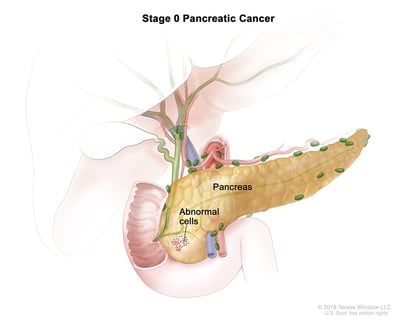
Stage I Pancreatic Cancer
The tumor is found only in the pancreas.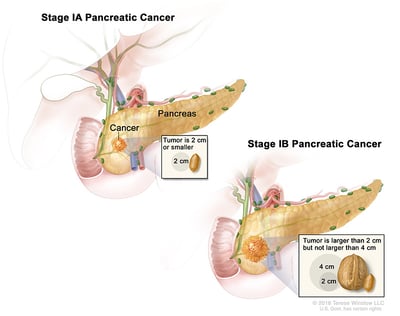
Stage II Pancreatic Cancer
The tumor has invaded nearby tissue but not nearby blood vessels. The cancer may have spread to the lymph nodes.
- Stage IIA Pancreatic Cancer
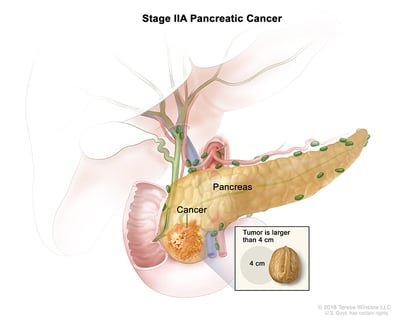
- Stage IIB Pancreatic Cancer
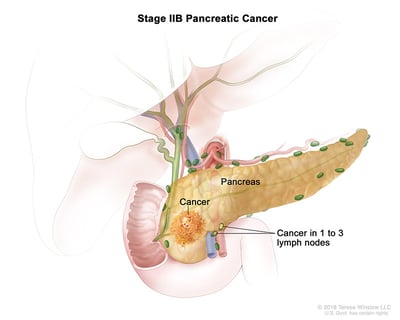
Stage III Pancreatic Cancer
The tumor has invaded nearby blood vessels.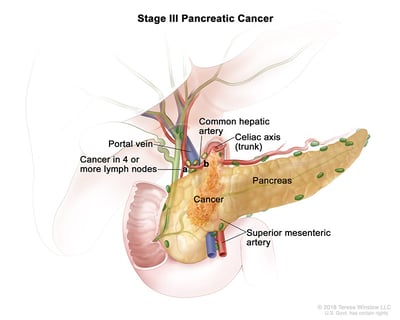
Stage IV Pancreatic Cancer
The cancer has spread to a distant organ, such as the liver or lungs.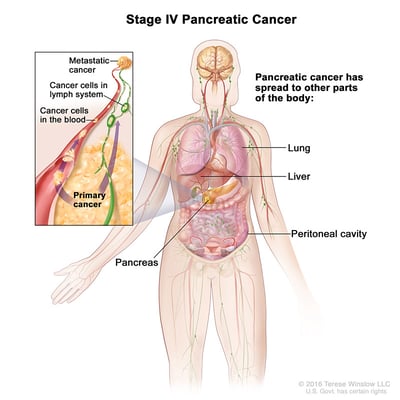
Pancreatic Cancer Treatment Options
Treatment options for people with cancer of the pancreas are surgery, chemotherapy, targeted therapy, and radiation therapy. You’ll probably receive more than one type of treatment.
The treatment that’s right for you depends mainly on the following:
- The location of the tumor in your pancreas
- Whether the disease has spread
- Your age and general health
At this time, cancer of the pancreas can be cured only when it’s found at an early stage (before it has spread) and only if surgery can completely remove the tumor. For people who can’t have surgery, other treatments may be able to help them live longer and feel better.
You may have a team of specialists to help plan your treatment. Specialists who treat cancer of the pancreas include surgeons, medical oncologists, radiation oncologists, and gastroenterologists.
Your health care team can describe your treatment choices, the expected results of each, and the possible side effects. Because cancer treatments often damage healthy cells and tissues, side effects are common. These side effects depend on many factors, including the type and extent of treatment. Side effects may not be the same for each person, and they may even change from one treatment session to the next. Before treatment starts, ask your health care team about possible side effects and how treatment may change your normal activities. You and your health care team can work together to develop a treatment plan that meets your needs.
Treatment Types for Pancreatic Cancer
Surgery
Surgery may be an option for people with an early stage of pancreatic cancer. The surgeon usually removes only the part of the pancreas that has cancer. But, in some cases, the whole pancreas may be removed.
The type of surgery depends on the location of the tumor in the pancreas. Surgery to remove a tumor in the head of the pancreas is called a Whipple procedure. The Whipple procedure is the most common type of surgery for pancreatic cancer. You and your surgeon may talk about the types of surgery and which may be right for you.
In addition to part or all of your pancreas, the surgeon usually removes the following nearby tissues:
- Duodenum
- Gallbladder
- Common bile duct
- Part of your stomach
Also, the surgeon may remove your spleen and nearby lymph nodes.
Surgery for pancreatic cancer is a major operation. You will need to stay in the hospital for one to two weeks afterward. Your health care team will watch for signs of bleeding, infection, or other problems. It takes time to heal after surgery, and the time needed to recover is different for each person. You may have pain or discomfort for the first few days. It’s common to feel weak or tired for a while. You may need to rest at home for one to three months after leaving the hospital.
Chemotherapy
Chemotherapy uses drugs to kill cancer cells. Most people with pancreatic cancer get chemotherapy. For early pancreatic cancer, chemotherapy is usually given after surgery, but in some cases, it’s given before surgery. For advanced cancer, chemotherapy is used alone, with targeted therapy, or with radiation therapy.
Chemotherapy for pancreatic cancer is usually given by vein (intravenous). The drugs enter the bloodstream and travel throughout your body. Chemotherapy is given in cycles. Each treatment period is followed by a rest period. The length of the rest period and the number of cycles depend on the anticancer drugs used. Some drugs used for pancreatic cancer also may cause tingling or numbness in your hands and feet.
Targeted Therapy
People with cancer of the pancreas who can’t have surgery may receive a type of drug called targeted therapy along with chemotherapy.
Targeted therapy slows the growth of pancreatic cancer. It also helps prevent cancer cells from spreading. The drug is taken by mouth.
Side effects may include diarrhea, nausea, vomiting, a rash, and shortness of breath.
Radiation Therapy
Radiation therapy uses high-energy rays to kill cancer cells. It can be given along with other treatments, including chemotherapy.
The radiation comes from a large machine. The machine aims beams of radiation at the cancer in the abdomen. You’ll go to a hospital or clinic 5 days a week for several weeks to receive radiation therapy. Each session takes about 30 minutes.
Although radiation therapy is painless, it may cause other side effects. The side effects include nausea, vomiting, or diarrhea. You may also feel very tired.






.jpg)
